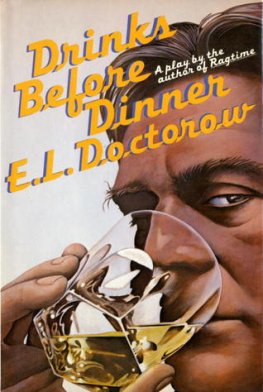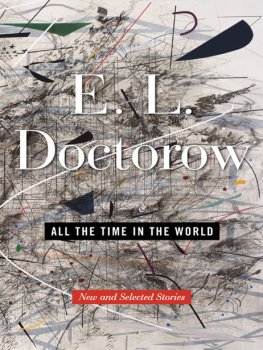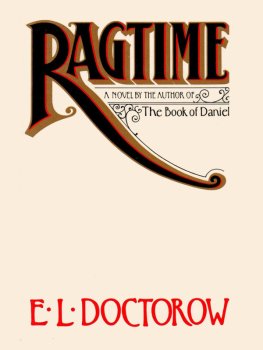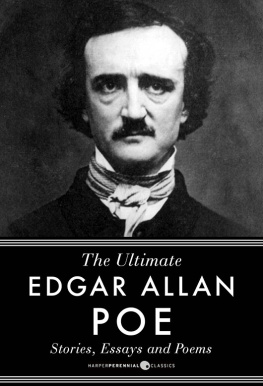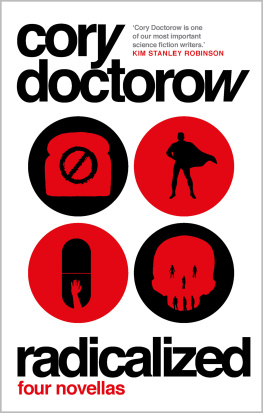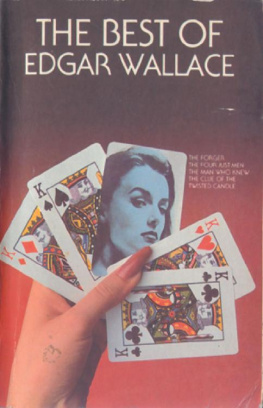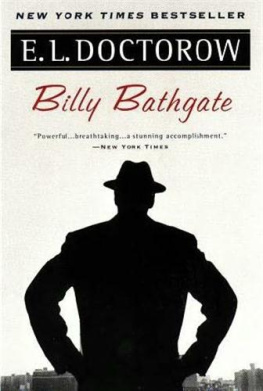Edgar Doctorow - Drinks Before Dinner
Here you can read online Edgar Doctorow - Drinks Before Dinner full text of the book (entire story) in english for free. Download pdf and epub, get meaning, cover and reviews about this ebook. year: 2011, publisher: Random House, genre: Detective and thriller. Description of the work, (preface) as well as reviews are available. Best literature library LitArk.com created for fans of good reading and offers a wide selection of genres:
Romance novel
Science fiction
Adventure
Detective
Science
History
Home and family
Prose
Art
Politics
Computer
Non-fiction
Religion
Business
Children
Humor
Choose a favorite category and find really read worthwhile books. Enjoy immersion in the world of imagination, feel the emotions of the characters or learn something new for yourself, make an fascinating discovery.
- Book:Drinks Before Dinner
- Author:
- Publisher:Random House
- Genre:
- Year:2011
- Rating:3 / 5
- Favourites:Add to favourites
- Your mark:
- 60
- 1
- 2
- 3
- 4
- 5
Drinks Before Dinner: summary, description and annotation
We offer to read an annotation, description, summary or preface (depends on what the author of the book "Drinks Before Dinner" wrote himself). If you haven't found the necessary information about the book — write in the comments, we will try to find it.
Edgar Doctorow: author's other books
Who wrote Drinks Before Dinner? Find out the surname, the name of the author of the book and a list of all author's works by series.
Drinks Before Dinner — read online for free the complete book (whole text) full work
Below is the text of the book, divided by pages. System saving the place of the last page read, allows you to conveniently read the book "Drinks Before Dinner" online for free, without having to search again every time where you left off. Put a bookmark, and you can go to the page where you finished reading at any time.
Font size:
Interval:
Bookmark:
E. L. Doctorow
Drinks Before Dinner
TO SAM COHN
INTRODUCTION
This play originated not in an idea or a character or a story, but in a sense of heightened language, a way of talking. It was not until I had the sound of it in my ear that I thought about saying something. The language preceded the intention. Its possible that the voice the writer discovers may only be the hallucination of his own force of will; nevertheless, the process of making something up is best experienced as fortuitous, unplanned, exploratory. You write to find out what it is youre writing. Marcel Duchamp was once asked why he gave up painting. Too much of it is filling in, he is reported to have said. The worker in any medium had best give it up if he finds himself only filling in what had been previously declared and completed in his mind, a creative fait accompli. Writers live in language, and their seriousness of purpose is not compromised nor their convictions threatened if they acknowledge that the subject of any given work may be a contingency of the song.
Now, this language of the play, this way of talking, derives from two very odd sources, the prose of Gertrude Stein and Mao Tse-tung. I read a quotation of Maos one day from a speech he gave to his officers in the field sometime in the 1930s. And the rhetoric of it was startlingly like Stein. I think now it is probable that anything transliterated from the Chinese sounds like Gertrude Stein, but I was set off nevertheless. I reasoned that a style of language common to an American expatriate avant-gardiste who lived in Paris seventy years ago and the political leader of eight hundred million people was worth the writers attention.
I didnt analyze this language but merely set out to see if I could do it. It is a frankly rhetorical mode that loves repetition, the rhythm of repetition, and at its best finds the unit of sense not in the clause or the sentence, but in the discursion. I have since detected a similar sound in the recorded lectures of Zen masters and in sections of the Old Testament. Once you hear it, it is all around. Its a spoken language, a flexible language with possibilities of irony and paradox that are as extended as any modernist could wish, but a simplicity to satisfy the most primitive narrative impulse. I quickly and easily wrote four or five thousand words and took the opportunity to deliver them aloud several times in public readings in different parts of the country. I gradually understood I had composed a monologue, that someone was speaking and that he had a lot on his mind. His point of view was so single-minded in fact, and his dissatisfactions so vast, that everything he said could be answered by someone stepping a little bit to one side or the other of where he stood.
I began to respond to his remarks with the remarks of others. They were soon engaged in dialogue, and to keep things clear I had to give them all names. The one who started everything, the malcontent, I gave the name Edgar. But they were all in the same universe, these people; they were defined by how they spoke, in this heightened language that seemed to ebb and flow and rise and break on itself. The leisure for such language seemed to me to go hand in hand with privilege, Chairman Mao notwithstanding. I had a sense of time that had been bought, accomplishment of the kind our society endorses. So I put them into a dinner party (the habitual means by which privileged people wait for the next day), I put drinks in their hands, and I wrote the play.
Now, what this account says about my dramaturgy may seem to betray a serious flaw of composition. If the sound came first, the words second, and the names third, do we not have here a defective understanding of what theatre is supposed to do? Apart from the fact that I find among playwrights I admire a tendency of all their characters to speak the same way, I suspect so. Especially if we are talking of the American theatre, in which the presentation of the psychologized ego is so central as to be an article of faith. And that is the point. The idea of character as we normally celebrate it on the American stage is what this play seems to question. I must here confess to a disposition for a theatre of language, in which the contemplation of this mans fate or that womans is illuminated by poetry or philosophical paradox or rhetoric or wit. A theatre of ideas is what has always interested me, plays in which the holding of ideas or the arguing of ideas is a matter of life or death, and characters take the ideas they hold as seriously as survival. All of this is, dramatically speaking, un-American. What is clearly American is the theatre of pathos wherein a story is told about this man or that woman to reveal how sad his or her life is, or how triumphant, or how he or she does not realize fulfillment as a human being, or does realize it, or is trapped in his or her own illusions, or is liberated from them, or fails to learn to communicate love, or learns, or is morally defeated by ethnic or economic circumstances, or is not defeated. Comic or melodramatic, this is the theatre of domestic biography, and I contrast it to any other classical, absurdist, metaphysical, epic that avoids its bias of sociological realism.
This theatrical mode has been so exhausted by television and film that Im astounded it is still thought by playwrights to be useful and interesting. Because presumptions of form tend to control presumptions of thought, even what is most basic the solicitation of emotion from an audience must be questioned if the emotion is no more, finally, than self-congratulatory. Having written this play and seen it through its first production, I understand Brechts disavowal of standard theatrical emotion not only as an ideological decision but as a felt abhorrence for what is so cheaply and easily generated. Since the onslaught of television in the late forties, the dramatic mode has swept through all the media; everything is dramatized news events, the weather, hamburgers. The responsiveness of the media, print or electronic, to every new idea or event or terror is so instantaneous that, as many people have pointed out, experience itself has lost its value, which is to say, life as an experience rather than as a postulate for dramatic statement has begun to disappear from our understanding. Every protest, rage, every critique, is absorbed by our dramatizing machinery and then reissued in appropriate form. The writer confronts not only moral hideousness but the globally efficient self-examination in dramatic terms of that hideousness. Where is wisdom? Everyone has faster hands than the artist. His devices and tricks of the trade have long since been appropriated not only by the media but by the disciplines of social science, whose case studies, personality typing and composite social portraiture are the industrialized forms of storytelling.
What are the presumptions of thought determined by the formal presumptions of this play? As it happens, the corruption of human identity is exactly the preoccupation of the speaker or character (not to be coy) who sets off the action, and whose point of view annoys, frightens and, if Im right, finally enlightens the others. This is Edgar, whose complaint is with the weak Self that loses its corporeality to the customs and conventions and institutions of modern life. His dissatisfaction is so immense that he pulls a gun and looks for someone to blame.
But not only Edgar but all of the others too who join him in dispute speak in terms of human numbers, in images of replicating humanity, and of themselves not as individuals but as members of larger classes, and for a good deal of the time, but especially at the beginning of the play, their argument is in the first and third person plural. And when Edgar pulls the gun it turns out that he is crucially unattached to the act: it is the situation that determines what he is doing, the others define him as much as he defines himself, and his own intentions are something he may learn only as they occur not before. The images of replicating humans are reflected onstage in this one person divided from his subconscious impulses.
Font size:
Interval:
Bookmark:
Similar books «Drinks Before Dinner»
Look at similar books to Drinks Before Dinner. We have selected literature similar in name and meaning in the hope of providing readers with more options to find new, interesting, not yet read works.
Discussion, reviews of the book Drinks Before Dinner and just readers' own opinions. Leave your comments, write what you think about the work, its meaning or the main characters. Specify what exactly you liked and what you didn't like, and why you think so.

